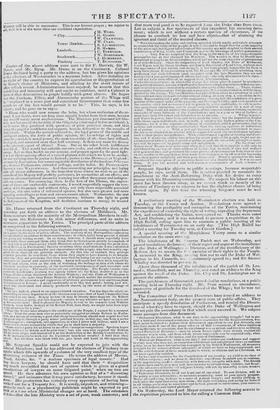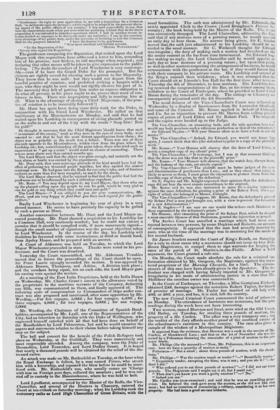A preliminary meeting of the Westminster electors was held on
Tuesday, at the Crown and Anchor. Resolutions were agreed to denouncing the prodigality and corruption of the Tories, maintaining the expediency of extending the right of voting, repealing the Septennial Act, and establishing the Ballot, were agreed to. Thanks were voted to Lord Durham ; and it was resolved to present a requisition to the High Bailiff, calling upon him to summon a public meeting of the inhabitants of Westminster on an early day. [The High Bailiff has called a meeting for Tuesday next, at Covent Garden.]
A special meeting of the Marylebone Vestry came to a similar resolution on the same eveh:vg.
The inhabitants of St. Pancras Parish met on Wednesday, and passed resolutions declarator: of their regret and anger at the installation of the Duke of Wellington As Dictator, and of the insufficiency of the Reform Act to secure the fr •ct exercise of their rights to the People. A memorial to the King, nrAying him not to call the Duke of Wel- lington to his Councils, wit- isianimously agreed to; and Sir Samuel Whalley was directed to pre ;eat it.
About three thousand of the inhabitants of the parish of St. Leo- nard's, Shoreditch, met on Thursdsy, and voted an address to the King against the recall of the Duke. Mr. Cley and Dr. Lushington are to present the address.
The parishioners of Greenwich passed similar resolutions, at a public meeting held on Thursday night, Mr. Penn moved an amendment, expressive of gratitude for the dismissal of the Whigs; but he was not seconded.
The Committee of Protestant Dissenters have issued an address to the Nonconformist body, on the present state of public affairs. They anticipate a speedy dissolution of Parliament, and remind the Dissen- ters of what they have to expect, should the Duke of Wellington and his-set gain the ascendancy in that which must succeed it. We subjoin
some passages from this document.
" Protestant Dissenters, what is our duty in the approaching struggle? but to pre, sent a bold and determined resistance to those candidates for the Representation, wire: have never hesitated to declare their determined opposition to our just dent:nulls, and who have made it one of the many offen ies of that flovernment, of whose tardiness and inefficiency we complain, that its attachment was so ardent, audits vieus so liberal, toward Protestant Disseutews—men hy whom former rights were sternly resisted till resistance was in vain, and from whom future conco,sions can be expected only, when estorted by the voice of the nation, and the vote of Parliament. " Protestant Dissenters, what is our duty ? but to refuse our confidence and support to el ery atitn who does not, in connexion with liberal and enlightened views on national policy, al ow his fixed determination to support in the British Parliament, all measures designed for the redrese of those grievances of which we have so long complained, and for the establishinent of those sacred rights to which, as citizens and as Christiaus,
are most egiiiiably entitled.
"In love and veneration for the Constitution of our country, we yield to no class of ottr fellowisilbjects ; and we deem it, therefor.% supeillitous to exhort you to combine, in the approaching cotifFet, discretiou with firmness, integrity with zeal. The [nen& of intuit:lance anti ',Lolly may well haw recourse to intimidation, sbolence, and fraud: bat the advocates of filierty—of religious loberty, will not, by unworthy means, weaken and dishonour their holy cause. " Protestant Dissenters, be of one heart and of one mind. To sow division. Will be the policy of your adversaries; to maintain unauinlit y, must be your steady purpose. Merge alt conflicting feelings in a sense of general danger ; and readily yieldiug to each other the right that every man claim:, the right to thinking and acting for himself in all things pertainitig to conscience and to God, present to intolerance, your cornea'r5 foe, a welbordered and united phalanx." On Wednesday, the Lord Mayor returned the following answer to the requisition presented to him for calling a Common Hall. "Gentlemen —In reply to your application to me with a requisition for a Common ' to deliberate upon the measurer ss hich ought to be adopted in the prescot alarm. inic aspect of the public affairs of our country. I beg most respectfully to say. that (rum the observations made when you were with me yesterday, I found that in the above proposition it was intended to introduce questions which I had in another recent in. stance decided as improper to be discitased under my authority : I am. in the conscien- tious discharge of my public duty, under the necessity of declining to call the Common
Hall for the purposes Intended. I have the honour to be, gentlemen, "Your most obedient and faithful servant,
" To the Deputation of the " Detail( WINCIIESTEL" "Livery who signed the Requisition,"
The gentlemen composing the deputation, that waited upon the Lord Mayor with this requisition, have addressed a letter to him, reminding him of his promise, now broken, to call meetings when required ; and declaring that other means will be taken to give expression to the public feeling. [No doubt the conduct of Lord Winchester is very contempt- ible—even if he have the Grand Duke for his prompter. But the citizens are rightly served for electing such a person to the Mayoralty. They knew that he was unfit : but they would not depart from the baneful practice of rotation ; and preferred striking a bargain with a man, who they might be sure would not rigidly observe his part of it. The necessity they felt of putting him under an express obligation to do what all persons in his place ought to do, proves their want of con- fidence in him. There was impropriety and folly in trusting him at all. What is the advantage of electing a Chief Magistrate, if the prac- tice of rotation is to be invariably followed?] Mr. Hunt has again been doing some dirty work for the Duke, in conjunction with his friend Lord Winchester. He called on that functionary at the Mansionhouse on Monday, and said that he had waited upon his Lordship in consequence of seeing placards posted up on the walls in and out of the City with the words" Stop him ! Run for gold !"
He thought it necessary that the Chief Magistrate :should know that such " inventions of the enemy," weak as they were in the eyes of every body, were resorted to : not that he had the most distant apprehensions from them ; the object was as palpable as the result was a failure. There was one of those placards opposite to the Mansionhouse within view from the place where his Lordship sat ; but, notwithstanding all the pains taken, those Who tried such an experiment to "get up a crisis" would stand no chance of succeeding. There was no more alarm now than existed months ago.
The Lord Mayor said that the object was plain enough, and certainly not the least alarm or bustle was excited by the experiment.
Mr. Hunt said, that some years ago placards of the kind would have had the effect of gathering ten thousand people together, but they excited the utmost contempt now. He bad gone into the Bank for curiosity's sake, and of fourteen cashiers no more than five were occupied ; so much for the alarm. The Lord Mayor observed, that he rejoiced to find that the public had had the good sense not to he influenced by such a ridiculous expedient. Mr. Hunt—" You may depend upon it, my Lord Mayor, that those who set up the placard calling upon the people to run for gold, would be very glad to ran for gold or any thing which they could turn into gold."
The Lord Mayor—" I am obliged to you for your communication, Mr. Hunt, and am very happy to find that you have such regard for the public welfare."
Really Lord Winchester is beginning his year of glory in a very absurd manner. He seems to have precisely the capacity to be gulled by such a person as Hunt.
Another conversation between Mr. Hunt and the Lord Mayor oc- curred yesterday. Mr. Hunt showed a requisition to his Lordship for a Common Hall, very cautiously worded ; but be could not extract a promise that it should be complied with, if more numerously signed— though the small number of signatures was the present objection taken by Lord Winchester. In the course of the day, his Lordship will doubtless be favoured with some instructions, at third or fourth hand, From Apsley House, and be prepared with an answer.
A Court of Aldermen was held on Tuesday, to which the Lord Mayor Winchester proceeded in state. Thanks were voted to his pre- decessor, and the Court was dissolved.
Yesterday the Court reassembled, and Mr. Alderman Venables i
moved that n future the proceedings of the Court should be open. Sir Peter Laurie strongly seconded the motion. It was opposed by Aldermen Brown' Thompson, and Atkins. A division took place ; and the numbers being equal, ten on each side, the Lord Mayor gave his casting vote against the motion.
At a meeting of the East India Proprietors, held at the India House on Wednesday, Mr. Charles Grant's assent to the allowance voted by the proprietors to the maritime servants of the Company, deducting one fifth, was communicated to them, and finally approved of. The following scale of compensation to Commanders of ships under con- tract was also proposed and sanctioned, after some opposition by Mr. Weeding,—For five voyages, 5,0001.; for four voyages, 4,500/. ; for three voyages, 4,0001.; for two voyages, 3,0001.; for one voyage, 2,0001.
Mr. Weeding, the Chairman of the Committee of Spanish Bond- holders, accompanied by Mr. Lyall, one of the Representatives of the City, had an interview on Saturday with the Duke of Wellington, who expressed himself satisfied with all that had been done on behalf of the Bondholders by Lord Palmerston, but said he would examine the papers and statements relative to their claims before taking himself any step on the subject.
The ball and concert for the benefit of the Polish Refugees took place on Wednesday, at the Guildhall. They were numerously and most respectably attended. .Among the company, were the Duke of Devonshire, Lord Tenterden, and Lord Dudley Stuart. It is hoped that nearly a thousand pounds will be obtained for the relief of the dis- tressed exiles.
An attack was made on Mr. Rothschild on Tuesday, at the hour when the Royal Exchange is fullest, by a man named Prince, who struck him with a horsewhip, and repeated the blow before he could be inter- fered with. Mr. Rothschild's son, who usually comes on 'Change with him on Foreign post days, collared the assailant ; and he was car- ried off in custody to the Mansionhouse, where he was held to bail.





















 Previous page
Previous page